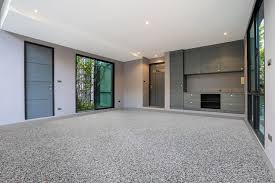Quartz coatings are revolutionizing the surface protection industry with their superior durability, aesthetic appeal, and long-term performance. From industrial settings to residential interiors, these coatings provide a perfect blend of strength and style. This comprehensive guide explores everything you need to know about durable quartz coatings—what they are, how they work, their applications, and why they’re becoming a top choice for modern flooring and surface solutions.
What Are Quartz Coatings?
Quartz coatings are high-performance surface systems made by combining resin (typically epoxy or polyurethane) with naturally occurring quartz granules. These granules, often colored and graded for consistency, provide a textured, non-slip finish. The resin binds the quartz particles together and secures them to the surface, creating a seamless, tough, and visually striking coating.
Why Quartz Coatings Are Known for Durability
Quartz is one of the hardest minerals on Earth, scoring 7 on the Mohs scale of mineral hardness. When combined with industrial-grade resins, it creates a surface that is:
- Impact-resistant
- Abrasion-resistant
- Chemical-resistant
- UV-stable (with certain formulations)
- Waterproof and non-porous
These properties make quartz coatings suitable for even the harshest environments while requiring minimal maintenance.
Key Benefits of Durable Quartz Coatings
1. Unmatched Strength & Longevity
Quartz coatings are designed to withstand heavy foot traffic, mechanical wear, and repeated cleaning without degrading. This makes them ideal for factories, hospitals, garages, and food processing plants.
2. Slip-Resistant Surface
The textured quartz granules create natural traction, making these coatings inherently anti-slip, even when wet—perfect for safety-conscious environments.
3. Aesthetic Flexibility
Available in a variety of colors and blends, quartz coatings can be customized to match interior design themes or corporate branding. Decorative options allow for a high-end finish without compromising on strength.
4. Chemical and Stain Resistance
The seamless surface resists spills from oils, acids, alkalis, and cleaning agents, protecting the substrate beneath. This makes it a preferred option in laboratories, commercial kitchens, and pharmaceutical environments.
5. Easy Maintenance
Thanks to its non-porous and sealed surface, quartz coating repels dirt, bacteria, and moisture. Routine cleaning with mild detergent is often enough to maintain its appearance and hygiene.
Common Applications of Quartz Coatings
Durable quartz coatings are incredibly versatile and used in a wide range of sectors:
| Application Area | Benefits Offered |
|---|---|
| Industrial Floors | Handles machinery, forklifts, and spills |
| Hospitals & Clinics | Hygienic, seamless, and easy to sanitize |
| Commercial Kitchens | Slip-resistant, stain-proof, and durable |
| Retail Stores | Aesthetic appeal and traffic resistance |
| Garages & Workshops | Oil-resistant, rugged, and long-lasting |
| Educational Institutions | Safe, cleanable, and visually appealing |
Types of Quartz Coating Systems
There are different types of quartz coating systems tailored for specific environments:
- Broadcast Quartz System
Multiple layers of quartz sand are broadcast into wet epoxy or urethane coatings to build up a thick, non-slip surface. Ideal for heavy-duty applications. - Trowel Quartz System
Quartz aggregates are troweled into resin to form a high-build, smooth, or textured finish—excellent for areas needing extra strength and custom visuals. - Slurry Quartz System
A mixture of quartz and resin is applied in a slurry form, then sealed. This method is faster and more cost-effective for large areas.
Installation Process: What to Expect
Installing durable quartz coatings involves several important steps:
- Surface Preparation: Concrete or substrate is cleaned, repaired, and shot-blasted or ground.
- Primer Application: A primer coat enhances bonding between substrate and coating.
- Quartz Broadcast or Troweling: Quartz is applied over wet resin in layers.
- Resin Sealing: Topcoat resin is applied to encapsulate the quartz and seal the surface.
- Curing Time: The coating is allowed to cure for full strength, typically 24–72 hours.
Note: Proper installation by certified professionals is key to maximizing durability and performance.
Cost Considerations
While initial installation costs for quartz coatings can be higher than traditional finishes like vinyl or tile, the long-term value is unmatched. Their longevity, low maintenance needs, and reduced repair frequency often result in lower total lifecycle costs.
- Residential Installation: $5 – $10 per sq. ft.
- Commercial/Industrial Grade: $10 – $15+ per sq. ft., depending on system complexity
Final Thoughts
Durable quartz coatings offer the ideal balance between form and function. Whether you’re looking for a heavy-duty industrial flooring solution or a clean, stylish finish for a commercial space, quartz coatings provide a long-lasting, safe, and aesthetically pleasing answer.
Key Takeaway: If durability, safety, and appearance are high priorities, investing in a quality quartz coating system is a smart, forward-thinking decision.


